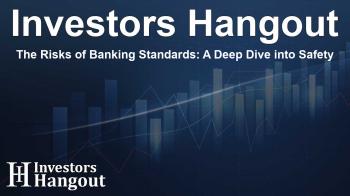The Risks of Banking Standards: A Deep Dive into Safety

Understanding Current Banking Risks
Banks are integral to the economy, ensuring that funds flow smoothly throughout various sectors. However, recent decisions to relax standards for banks have raised significant concerns about potential risks that may arise. Weiss Ratings, a prominent name in independent bank safety evaluations, has recently highlighted unsettling changes within the regulatory framework, impacting the trust that consumers place in banking institutions.
Changes in FCC Screening Standards
Weiss Ratings has brought to light that the FCC has amended its screening criteria, dramatically altering how banks qualify to manage letters of credit for governmental programs. Initially, only banks that achieved a Weiss rating of B- or higher qualified, representing a group of robust financial institutions. This approach has now shifted, allowing a far larger pool of banks deemed 'well capitalized' by federal regulators to enter this important category. This decision opens doors for 649 banks with weaker rating scores, highlighting a potential upward shift in financial vulnerability among participants.
The Impacts of Lowered Qualifying Standards
This regulatory alteration has serious implications for financial stability. Banks previously classified in the D+ (weak) range now receive a stamp of approval under the new rules. This could contribute to a false sense of security among customers and investors about the strength of their chosen banks. The decision raises eyebrows due to its foundations, as a staggering 99.4% of the nation’s banks are now classified as 'well capitalized,' reflecting a drastic dilution of risk standards.
Identifying the Riskiest Institutions
Among the banks included in the 'well capitalized' category is Bank of America, despite its significant unrealized losses. These losses raise questions about its actual financial health. Observations show that if required to realize these losses, the capital could diminish significantly, impacting not only investors but also depositors who rely on stability from their banks.
Concerns Over Financial Transparency
Among the financial giants, banks like Synchrony Bank, Flagstar Bank, and others possess rating scores that reflect significant risk. Such institutions operate with high asset totals but lack the financial resilience to weather economic storms effectively. Commentators express concern over how the FCC's ratings could lead the public to mistakenly believe these banks possess greater financial strength than they truly do.
Historical Context of Banking Failures
Reflecting on past financial crises, there is a worrying trend that suggests many banks deemed 'financially stable' today, like those from the crisis of the late 2000s, would not meet today's standards. The importance of rigorous rating systems is underscored by the significant predictions made by Weiss Ratings regarding bank failures in past decades. These historical insights highlight the critical need for stringent evaluations, especially as economic conditions evolve.
The Call for Enhanced Scrutiny
As banking regulators prepare to convene for a pivotal meeting, the call for heightened scrutiny regarding banking safety grows louder. Weiss Ratings founder, Robert Weiss, has voiced concerns on behalf of American households and businesses, advocating for increased transparency. There’s an urgent need for banks to operate under thorough examinations that prioritize financial security over mere compliance with generalized standards.
Weiss Ratings’ Legacy
With a history rooted in consumer protection, Weiss Ratings has proven itself a reliable source in predicting bank failures. The agency serves as a watchdog, ensuring that the public receives insights on banking stability and risk levels. Weiss's commitment to independence also fosters trust within the consumer base who depend on accurate financial guidance without conflict of interest.
Frequently Asked Questions
What changes were made to the FCC's banking standards?
The FCC relaxed its screening standards, allowing banks with lower Weiss ratings to qualify for letters of credit previously reserved for stronger institutions.
What risks do weak-rated banks pose to consumers?
Weak-rated banks carry a higher likelihood of financial troubles, which could impact consumer deposits and overall market stability.
How does Weiss Ratings evaluate bank stability?
Weiss Ratings uses historical data and analytical methods to provide independent assessments of banks' financial health and potential risks.
Why is it important for banking institutions to maintain strong ratings?
Strong ratings indicate financial health, which fosters consumer confidence and stability across the banking system, preventing crises.
What role does regulatory oversight play in banking?
Regulatory oversight is crucial to ensure that banks adhere to safety standards, protecting consumers and the wider economy from systemic risks.
About The Author
Contact Ryan Hughes privately here. Or send an email with ATTN: Ryan Hughes as the subject to contact@investorshangout.com.
About Investors Hangout
Investors Hangout is a leading online stock forum for financial discussion and learning, offering a wide range of free tools and resources. It draws in traders of all levels, who exchange market knowledge, investigate trading tactics, and keep an eye on industry developments in real time. Featuring financial articles, stock message boards, quotes, charts, company profiles, and live news updates. Through cooperative learning and a wealth of informational resources, it helps users from novices creating their first portfolios to experts honing their techniques. Join Investors Hangout today: https://investorshangout.com/
The content of this article is based on factual, publicly available information and does not represent legal, financial, or investment advice. Investors Hangout does not offer financial advice, and the author is not a licensed financial advisor. Consult a qualified advisor before making any financial or investment decisions based on this article. This article should not be considered advice to purchase, sell, or hold any securities or other investments. If any of the material provided here is inaccurate, please contact us for corrections.

